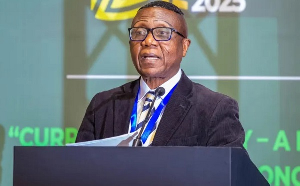By Samuel Hinneh
The cocoa sector in the second largest producer globally, Ghana, is being devastated as a result of illicit financial flows via trade mispricing, according to the latest African Union (AU) Panel report on illicit financial flows.
The report known as the Mbeki High Level report revealed that Ghana is estimated to have lost US$8.1 billion from 2001-2010 in illicit financial flows, citing cocoa exports as a rising sector for illicit financial flows via trade mispricing.
During the West and Central Africa regional consultation of the report which took place in Accra, it emerged that Ghana accounts for 26.4% of all illicit financial flows from the cocoa sector.
The report was launched during the24th AU Summit in Addis Ababa, Ethiopia from January, 23-31, 2015.
Christian Freymeyer, a spokesperson for the Financial Transparency Coalition, a global network of NGOs working on financial transparency issues, says Illicit financial flows don't respect national borders, so they aren't just a problem for the people of Ghana or Nigeria or Kenya in a vacuum; they need to be viewed as the global problem.
While illicit money is leaving developing countries at an alarming rate, it finds a safe haven in banks across Europe and the United States of America (USA), he added.
“But with strengthened financial transparency regulations, like public registers of the true owners of companies, public financial reporting by corporations on a country-level, and the robust exchange of financial information between tax authorities around the world, governments would have a much easier time not only finding illicit flows, but stopping them before they start’’, Mr Freymeyer noted.
According to the spokesperson, it's vital that government agencies responsible for specific economic sectors focus on the capacity building and technical knowledge necessary to detect and deter illicit financial flows.
The Mbeki report suggest that the best way to curb illicit financial flows is through increased financial transparency regulations. However, for financial transparency measures to really have a positive effect, it's necessary that countries in Africa have the capacity and technology necessary to identify and track illicit financial flows, he emphasised.
“It's vital that alongside new transparency measures, countries place a focus on capacity building within the relevant agencies’’, Mr Freymeyer says.
“It’s vital that global accounting and tax enforcement policies being established by the G20 and other international bodies fully encompass the needs and context of Africa’’, he said.
Opinions of Thursday, 26 February 2015
Columnist: Hinneh, Samuel














